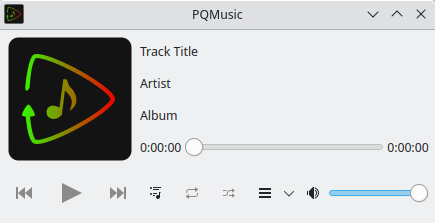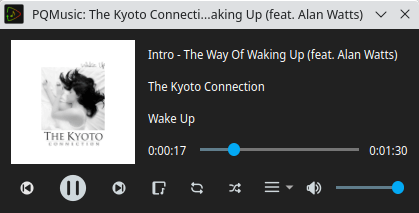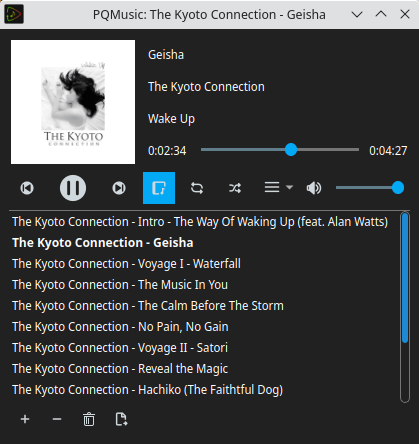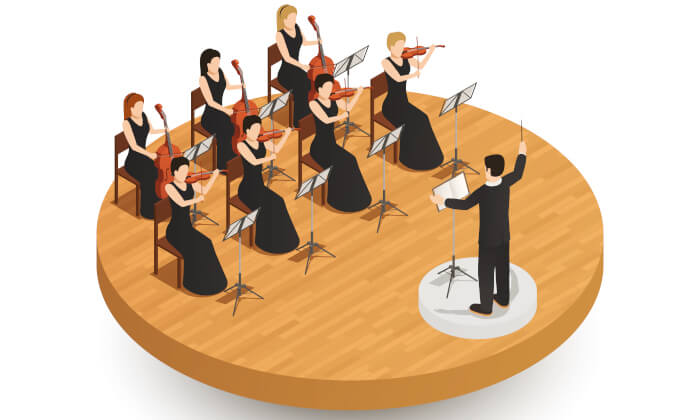In Operation
Here’s an image of PQMusic on startup.

The bottom row hosts playback icons as well as a hamburger icon. Clicking this icon lets us add files, folders, URLs, as well as open playlists, and access some configuration settings. The interface is nicely presented with album art, and the ability to drag and drop music on to the interface.
As we encountered a playback issue with our version built from the AUR, we moved over to the project’s AppImage. In the image below, we’re playing a Creative Commons licensed album from The Kyoto Connection. This album is in mp3 format.

Here’s the current playlist for the album we added.

While files encoded with MP3 played well with the AppImage version, both the AUR built and the AppImage refused to play the vast majority of FLAC files, borking with an error:
QThread: Destroyed while thread is still running
Aborted (core dumped)
This issue occurs with release v1.2.0, v.1.2.1 (29 July 2022) and Release ci (22 August 2022).
As mentioned above, there are various configuration options available. These are:
- Select the default music folder.
- Option to show notifications when changing songs.
- Option to minimize the program to the system tray when closing the window.
- Option to download the album cover if it’s not found locally.
- Save volume on close.
- Save/open playlist on opening/closing.
Next page: Page 3 – Memory Usage
Pages in this article:
Page 1 – Introduction / Installation
Page 2 – In Operation
Page 3 – Memory Usage
Page 4 – Summary

Thanks, I like DeaDBeeF
Yes, we like DeaDBeeF too, it scored fairly highly in our music players roundup.
DeaDBeeF: almost as fun to type as it to listen
Another software application with just a stupid name
Much software development seems to be fairly pointless.
We have small players already. DeaDBeeF plays anything, Audacious is nicer on KDE, QMMP is cute, Strawberry is great for opening a folder> opens in new playlist… and many others.
We have amazing features – looking at Guayadeque, which is now dying – but which has the MOST convenient Lyrics (autosearch, click to search, click to open search in browser – copy paste and save text to the track), as well as a superb playlists functionality, superb filtering and Smartplay, and many features lacking in most new players.
Why aren’t NEW players interested to bring forward the best functions? Maybe New developers are just too lazy to research before they design…
Ben, you make some interesting points. Linux is very strong in some areas (such as music players) and yet very weak in many other software genres. Points to bear in mind:
– Open source developers have no obligation to include things like filtering and smartplay or other features some people deem important. Many projects start out with a developer wanting a music player that meets their needs, which obviously won’t necessarily accord with others.
– Define best functions? Someone may want gapless playback or refined playlists, someone else wants things like an equalizer. Adding everything under the sun is likely to result in a bloated program with tons of bugs. It’s much harder to maintain complex software particularly for a sole developer.
– Some features are harder to code than others. Many open source developers are coding in their spare time, they are going to focus on what is important to them
– Some developers take donations, they may be willing to add features that some users want if there’s a financial incentive to do so. Unfortunately, so many people leech, never helping financially with any open source project (or even in some other way). When you look at a project’s GitHub many music players code is written almost exclusively by a single person.
– A developer writes a program for different reasons e.g. they may write a music player to help them learn a new language or toolkit.
– You say Guayadeque is dying. I’ve never tried that one. Assuming it’s open source, there’s nothing to stop anyone from forking the project and carrying on with the project.